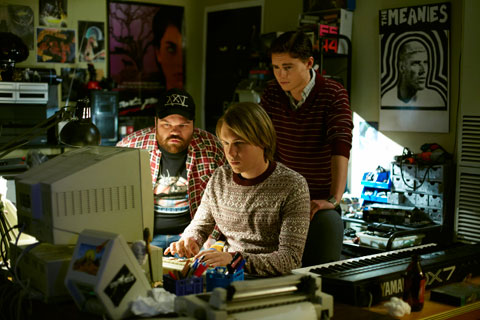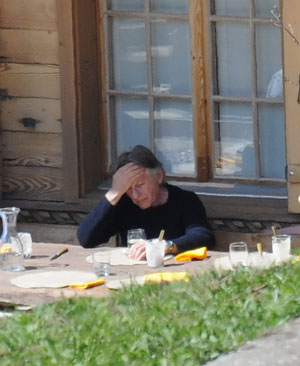Toronto International Film Festival 2012—Part 7
Underground: The Julian Assange Story and Roman Polanski: Odd Man Out
By Joanne Laurier
12 October 2012
This is the seventh of a series of articles devoted to the recent Toronto film festival (September 6-16). Part 1 was posted September 22, Part 2 September 26, Part 3 September 28, Part 4 October 2, Part 5 October 5 and Part 6 October 9.
Julian Assange, a founder of WikiLeaks, has been the target of relentless persecution by the US government and its allies in Europe and Australia. Assange’s crime? His organization’s exposure to the public, through the release of diplomatic cables and other documents, of the everyday global operations of the American state, operations that are conspiratorial, illegal and violent. For that he was branded a “terrorist.”
The legal witch-hunt against Assange and the accompanying smear campaign, conducted by a servile media, demonstrate how far the American ruling elite has shifted in the direction of anti-democratic and authoritarian forms of rule. Increasingly it responds to serious opposition to its geopolitical designs not with debate—but with censorship, imprisonment and assassination.
The case of Polish-born filmmaker Roman Polanski is quite different. Not an opponent of the American status quo, except through his artistic critiques in works such as Chinatown and, more recently, The Ghost Writer, Polanski, nonetheless, fell afoul of US officialdom decades ago. The director refused to submit to judicial double-dealing following his trial for having sex with an underage girl in 1977, and left the country for good.
The cases of Assange and Polanski can be discussed in one breath only to the extent that the official campaigns against them have been bolstered and supported by members of the same “sordid coalition” of feminists and identity politics practitioners. Studiously blind to the principled questions involved, above all, the strengthening of the power of the capitalist state to pursue and stifle anyone considered a thorn in its side, these elements have lined up with the extreme right in stridently asserting that neither Assange nor Polanski is “above the law.”
 Underground: The Julian Assange Story
Underground: The Julian Assange StoryThe Toronto film festival screened a fictionalized account of Assange’s early life (Underground: The Julian Assange Story), as well as a follow-up documentary on the Polanski saga (Roman Polanski: Odd Man Out). In distinct ways, each movie presents a rounded and sympathetic picture of its respective controversial subject. The filmmakers, as we have indicated, are beginning to respond with some sensitivity to big developments.
Underground: The Julian Assange Story
Julian Assange was arrested in London in December 2010 on frame-up sex charges, organized by Swedish and most probably US authorities. WikiLeaks had committed the unpardonable crime of releasing incriminating documents, as well as video footage, which detailed the involvement of Washington and its allies in torture, rendition, assassination and regime change and, in particular, exposed the criminality of the US-led military interventions in Afghanistan and Iraq.
Underground: The Julian Assange Story from Australian director Robert Connolly (The Bank, 2001 and Balibo, 2009) is a fiction film about Assange’s life as a young hacker in the late 1980s in Melbourne, Australia.
Drawing material from an updated version of Underground, a work co-authored by Suelette Dreyfus and Assange, Connolly seeks to reconstruct the formative years of a talented teenager who developed into an adult determined to expose government malfeasance.
 Underground: The Julian Assange Story
Underground: The Julian Assange StoryIn the movie, Julian (Alex Williams) is part of an underground hacking sub-culture that he joins around 1988 under the handle “Mendax.” In 1989, the NASA computer system is attacked from Australia through the introduction of the WANK worm. It is an attempt to sabotage the Jupiter launch of the Galileo rocket as part of an anti-nuclear protest. Although no one claims responsibility, the film infers that Assange is involved.
That year, Mendax/Julian and two friends form a group called the “International Subversives,” defining themselves as “white hat hackers,” who look but don’t steal and share all information they discover. The other members of the group are Prime Suspect (Callan McAuliffe) and Trax (Jordan Raskopoulos), the latter being a “phreaker”—a leading expert in telephony (the use of equipment to communicate over distances, by connecting telephones to one another). Their motto is “we are going to reveal the truth.”
Julian and his bohemian, free-thinking mother Christine (Rachel Griffiths) have been running for years from the father of Julian’s younger brother, who wants to abscond with the child and integrate him into his (the father’s) cult, known as The Family. Christine is an anti-nuclear campaigner, who drags Julian along to demonstrations. Ridiculing his mother’s favorite prop, a giant paper maché Uncle Sam puppet, the young Assange tells her, “Your puppets change nothing. They’ll still launch plutonium into space.”
Electra (Laura Wheelright), Julian’s girlfriend, eventually gets pregnant and wants him to abandon his hacktivism. They are squatters living in rough conditions and her insistent demands eventually lead to their break-up.
The Subversives hack into several corporate and government systems, including one belonging to the Pentagon. An intrepid police detective Ken Roberts (Anthony LaPaglia) has been trying to trace the hackers using technology that is archaic compared to what the group has concocted. At the urging of the FBI, the Australian Federal Police set up a special task force to apprehend the trio. On the eve of his arrest, Julian hacks into Milnet (the US Military Network website) and unearths information showing that civilian targets were deliberately bombed during the first Gulf War in 1990-1991.
In a postscript the film explains Assange’s fate. In May 1995, he pleaded guilty to 25 charges of hacking, after six charges were dropped, and was released on bond for good conduct with a fine of Aus $2,100.
Underground is intelligently done. The fast-paced storyline is aided by outstanding performances from LaPaglia, Griffiths, and Wheelwright as Electra. Newcomer Williams is riveting as the young Julian.
After the film’s public screening in Toronto, Connolly told the audience that he felt it important to counter the aspersions and outright falsifications promoted by governments and the media against Assange, whom he quoted as saying, “I am an activist, the media has lost its way.”
Roman Polanski: Odd Man Out
The continued, vindictive harassment of film director Roman Polanski, now 79 years old, by the American government reeks of dishonesty, hypocrisy and expediency. In September 2009, Polanski was arrested by the Swiss government on his arrival in Zurich to attend a film festival, where he was to be honored. Nabbed at the airport, he was threatened with extradition to the US.
 Roman Polanski: Odd Man Out
Roman Polanski: Odd Man OutPolanski’s ordeal in Switzerland, where he endured months of house arrest before the Swiss government finally decided against extradition, is the focus of Marina Zenovich’s latest documentary, Roman Polanski: Odd Man Out.
Zenovich explains in the movie’s production notes that after “my 2008 documentary film Roman Polanski: Wanted and Desired [which examines the travesty of justice in the 1977 statutory rape case that led to Polanski fleeing the United States] was used as evidence of judicial and prosecutorial misconduct by Polanski’s legal team. I had to keep filming to see this story to its end. I planned for the follow-up to be a short film which looked at how the two central characters—Roman Polanski and Samantha Geimer [Polanski’s victim]—felt about the incident today … I never could have imagined what was about to happen …
“Meanwhile, it’s 37 years since the original offence and this endless controversial case remains no nearer to resolution … I have always disapproved of his actions, but I’ve also asked, how long does Roman Polanski have to pay for his crime?”
Odd Man Out refers to the title of the 1947 fugitive drama by Carol Reed, one of Polanski’s favorite films. Zenovich’s documentary highlights the main facts of Polanski’s sudden arrest in Switzerland, a country where he owns a chalet and has visited for decades without problem.
The film notes that one of the cynical motives behind the arrest was the anxiety of Swiss authorities to curry favor with the US government, which in 2008, at the height of the financial crisis, demanded information on thousands of bank accounts, allegedly connected to tax evasion, held at the Swiss banking giant UBS.
At the US end of things, the film suggests that Los Angeles County District Attorney Steve Cooley, a thoroughgoing “law and order” reactionary, was hoping to use the successful extradition of “child molester” Polanski as a springboard to statewide office.
Swiss officials eventually refused to extradite the filmmaker after the US government denied their request for the transcript of apparently damning testimony provided in January 2010 by Roger Gunson, the prosecutor in charge of the Polanski case in 1977.
Gunson reportedly testified that in September 1977 Judge Laurence Rittenband had assured the prosecution and defense in the Polanski case that the 42 days the director had spent in detention “represented the whole term of imprisonment he was condemned to” (press statement from the Swiss Federal Council). Rittenband later went back on this promise and threatened to throw the book at Polanski, causing him to run.
At the time of his September 2009 arrest in Switzerland, Polanski was finishing work on The Ghost Writer, whose central character is implicated in war crimes and is obviously based on former British Prime Minister Tony Blair.
The interviews Zenovich conducts with Samantha Geimer, the girl in the original case, produce some of Odd Man Out’s most remarkable moments. Geimer continues to be hunted by the media, the strain of which is evident in her husband’s agitated reaction to the renewed hype about the case, “This shit’s got to come to an end.”
Geimer refers to Polanski’s “bad mistake” and his “really poor judgment” in 1977, but rejects the notion that he is a “pedophile” or a “child rapist … That’s not what he is.” She cannot fathom why, if she has forgiven Polanski, the authorities cannot let him—and therefore also Geimer and her family—live in peace.
Shortly after Polanski’s arrest, Geimer told ABC News: “I was terrified and shocked and had no warning. I was on vacation. The media descended on my home, questioned my sons. They couldn't leave the house. I was accosted at the airport, I couldn't go home, I had to sleep at my office.
“My sons should never have had to know what it’s like to deal with that. In the back of their mind, they know something bad happened to mom and they don’t really want to hear about it. … So, yeah, I’m angry.”
Roman Polanski: Odd Man Out shows that the US authorities had no legal leg to stand on in their operation against Polanski. The new bunch in charge of the Los Angeles legal system are as venal and unprincipled as their counterparts 35 years ago. Their on-going vendetta against Polanski—whose long career has been devoted, in the filmmaker’s words, to a battle against “injustice and intolerance and prejudice and superstition”—has far more to do with current political and economic concerns than with an incident that occurred in 1977.
To be continued





Follow the WSWS